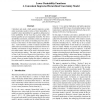Free Online Productivity Tools
i2Speak
i2Symbol
i2OCR
iTex2Img
iWeb2Print
iWeb2Shot
i2Type
iPdf2Split
iPdf2Merge
i2Bopomofo
i2Arabic
i2Style
i2Image
i2PDF
iLatex2Rtf
Sci2ools
ISIPTA
1999
IEEE
1999
IEEE
Lower Desirability Functions: A Convenient Imprecise Hierarchical Uncertainty Model
I introduce and study a fairly general imprecise secondorder uncertainty model, in terms of lower desirability. A modeller's lower desirability for a gamble is defined as her lower probability for the event that a given subject will find the gamble (at least marginally) desirable. For lower desirability assessments, rationality criteria are introduced that go back to the criteria of avoiding sure loss and coherence in the theory of (first-order) imprecise probabilities. I also introduce a notion of natural extension that allows the least committal coherent extension of lower desirability assessments to larger domains, as well as to a first-order model, which can be used in statistical reasoning and decision making. The main result of the paper is what I call Precision
ISIPTA 1999 | Lower Desirability | Lower Desirability Assessments | Mathematics | Modeller's Lower Desirability |
| Added | 04 Aug 2010 |
| Updated | 04 Aug 2010 |
| Type | Conference |
| Year | 1999 |
| Where | ISIPTA |
| Authors | Gert De Cooman |
Comments (0)

